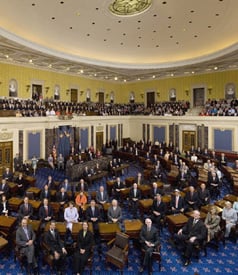
It was supposed to be the year of change. That did not happen. One year after Barack Obama’s election, Americans are realizing that one man, even this improbable messiah (or even Arnold “Terminator” Schwarzenegger in California) is not sufficient to the task. It’s the system that is at issue. The president should have fought a bit more, people will say. He could have surrounded himself with fewer “insiders,” those political professionals who make his presidency look like Clinton’s. But it’s clear that the political system is running out of steam.
Seldom have Americans had so many doubts about their model. A few weeks ago, two editorialists from opposite sides, Fred Hiatt (The Washington Post) and Thomas Friedman (The New York Times), speculated in the same terms: “Is American democracy paralyzed?”
The question is not overstated. The Democrats’ electoral triumph has not been followed by implementation of the reforms on which they campaigned. The machine is running at full bore, but the results are feeble, as though the motor were bridled. Fifteen months after the collapse of the banks, regulation of the financial system is just emerging from Congressional committees.
Health insurance reform has made it through the ordeal of the Chambers, but at the price of a superhuman effort. People are already saying that following this exploit, the climate change issue will probably be pushed to 2011, after the Congressional elections. In an election year, no representative wanted to be mixed-up in a new controversial vote.
Unions have not seen the reform that was supposed to facilitate their lives. It was an electoral promise, but, once he became president, Barack Obama has not wanted to aggravate the Republicans even more (a tactic that has not been particularly effective, as demonstrated by the example of the health care insurance reform).
Over half of new judges have not yet been appointed or confirmed by the Senate. The regularization of illegal immigrants is at a standstill. No one dares grab hold of the immigration issue at a time when unemployment is at a record level. House Speaker Nancy Pelosi has already made it known that the Democrats will not run any kamikaze missions in 2010 and will allow the Senate to take the lead.
Political scientists highlight the same problems: a political system of checks and balances that accords the Senate and rural states disproportionate blocking power, the Internet-cable television tandem that gives extremists on all sides an echo chamber with no relationship to their real weight, a permanent electoral campaign that leaves very little time for governing.
The centerpiece for this dysfunction is the filibuster, the practice of a “super majority,” which, in the Senate and in the Senate only, gives the minority obstructive power. As all those who expected miracles from Barack Obama now know, a majority of 60 votes in the Senate is required to “invoke cloture,” which, in the jargon of the Capitol, means putting an end to debate and moving on to a vote. As long as the 60 votes are not there, the senators leave debate open (there were over 800 hours during the health care system debate before the last hold-out allowed himself to be convinced).
The filibuster does not figure in the Constitution, even though the tradition of unlimited debate has been part of the Senate since its beginning. Why not change the system, then? There had been discussion of it in 2005 when the Republicans were revolted by the Democrats’ blockages, not of the financing of the war in Iraq, but of judicial appointments. Then there was talk of a “nuclear option” since it was the ultimate deterrent. The Republicans did not carry out their threats. And they are doing quite well today because of it. In their turn, it’s the Democrats who today demand the end of “filibusters.” But the White House is also not yet ready for that battle. Today’s majority will perhaps be tomorrow’s minority….
In The New York Times, Tom Friedman wondered in September whether China did not have “a political advantage” over the United States in confronting the challenges of the twenty-first century. On those subjects requiring speed and decisiveness, or which necessitate heavy investments, such as climate change, the one-party system is an advantage, he explained, compared to the functioning of two parties, one of which does everything to prevent the other from governing.
Friedman’s editorial created a scandal. Several weeks later, he qualified: “there’s no reason to “concede the Twenty-first Century to the Chinese,” he said. America will retain its premier position because it remains the paradise of creativity and imagination. “The iPod may be manufactured in China, but it was imagined in the United States.”
Thanks to senators’ Twitter messages, Americans can follow the stages of a filibuster in Congress minute by minute. As long as they’ve still got Facebook, Google, iTouch and all the other tools autocratic China is totally incapable of inventing, senators may bicker on, America is saved.
Translation: Truthout French Language Editor Leslie Thatcher.
Join us in defending the truth before it’s too late
The future of independent journalism is uncertain, and the consequences of losing it are too grave to ignore. To ensure Truthout remains safe, strong, and free, we need to raise $46,000 in the next 7 days. Every dollar raised goes directly toward the costs of producing news you can trust.
Please give what you can — because by supporting us with a tax-deductible donation, you’re not just preserving a source of news, you’re helping to safeguard what’s left of our democracy.